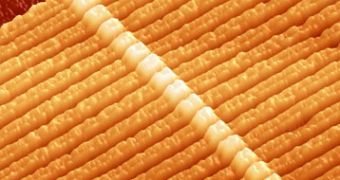In addition to the inductor, resistor and capacitor, there is a fourth basic circuit element that is less known, namely a type of resistor with memory that has been the subject of research at HP Labs since 2008. Dubbed a “memristor,” the circuit element was described as quite useful in future storage devices, mainly thanks to the fact that it does not need to be powered in order to retain data. More recently, HP has published a paper that states that, in addition to being faster, more energy efficient and twice as capacious as current solid state storage technologies, the memristors can also carry out computations like those handled by CPUs.
There are a variety of uses that HP sees for memristors. For instance, by stacking multiple layers of memristor memory on top of each other, storage chips could be created that would offer handsets an embedded memory capacity ten times greater than that available today. The same kind of chips could also be used in supercomputers, in order to speed up movie rendering and geometric research. Other benefits that these circuit elements bring are their immunity to radiation and the fact that they “do not 'forget'” stored data. In the future, this data-retention capability will allow computers to turn on and off instantly.
The latest advancement in memristor research seems to have gone beyond just these applications. With the discovery that such circuits are capable of logic, the possibility has now arisen for the creation of storage units that, instead of relying on a CPU to do their calculations for them, they will carry out those computations on their own, on the same chips where data is stored. This will ultimately lead to more and more compact devices with increasingly higher capacities and processing capabilities.
“Memristive devices could change the standard paradigm of computing by enabling calculations to be performed in the chips where data is stored rather than in a specialized central processing unit,” R. Stanley Williams, senior fellow and director, Information and Quantum Systems Lab, HP, states. “Thus, we anticipate the ability to make more compact and power-efficient computing systems well into the future, even after it is no longer possible to make transistors smaller via the traditional Moore’s Law approach.”
HP hopes to develop working memristive devices in a few years.

 14 DAY TRIAL //
14 DAY TRIAL //